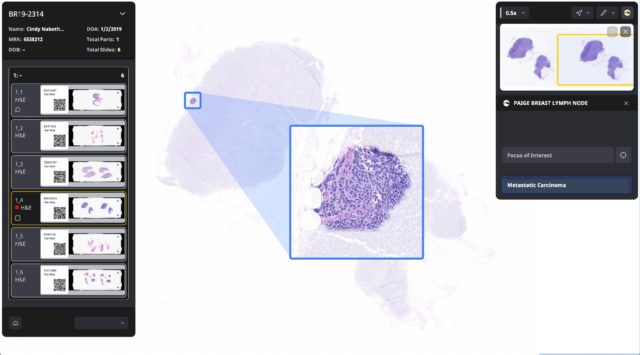
Paige Breast Lymph Node was designed to help pathologists detect breast cancer that has spread to the lymph nodes.
Cancer screening is vital in detecting potentially life-threatening malignancies early. But research shows that the number of practicing pathologists available to diagnose cancers has been steadily decreasing, dropping by nearly 18% over a decade’s time. That, in turn, has created opportunities for companies leveraging artificial intelligence to try and close the gap while also improving detection and evaluation of cancers.
On Thursday, New York City-based Paige, a startup spun out of Memorial Sloan Kettering Cancer Center that provides AI-based diagnostic software, launched its latest product, Paige Breast Lymph Node. The AI software helps pathologists detect breast cancer that has spread to the lymph nodes.
When breast cancer spreads, or metastasizes, it commonly invades the lymph nodes—structures that are part of the body’s immune system—as well as a few other organs or areas of the body such as the lungs and bones. Paige’s software is designed to find cancer in the lymph nodes that might otherwise be missed, including tiny collections of cancer cells called micrometastases.
The findings are then displayed at the individual lymph node level with Paige’s proprietary TissueMap. This highlights all regions that are suspicious for cancer, according to the company.
“We know that it is a struggle for pathologists to find small metastases, which is a burdensome and time-consuming task,” said Dr. Juan Retamero, medical director at Paige, in an email provided by a representative. “Paige Breast Lymph Node has been designed to detect small tumor deposits, helping pathologists be more efficient and safe in this regard.”
Paige’s technology, which was unveiled at the United States and Canadian Academy of Pathology (USCAP) Annual Meeting, is only currently available for research use in the U.S. But the digital pathology company is actively pursuing regulatory clearances for the software in the U.S., EU and U.K., Retamero said.
Company officials emphasized that the technology is meant to assist pathologists, not to replace their assessment.
“The key concept here is technology assisting pathologists, functioning as a diagnostic aid that is concurrent with the pathologist’s interpretive review,” Retamero said.
Paige Breast Lymph Node uses the same underlying AI technology as the company’s FDA-authorized Paige Prostate. That’s designed to identify acinar adenocarcinoma, a gland-forming cancer in the prostate, and highlight for pathologists the area of the prostate with the greatest probability of harboring cancer, Retamero explained.
Like the Paige Breast Lymph Node, Paige Prostate “can act as a second pair of eyes for the pathologist, helping them see small areas—foci—of cancer that may otherwise be missed,” he said.
Other companies are also employing AI to assist clinicians as well as researchers in pathology. PathAI, for example, provides AI-powered technology and machine learning to help doctors make an accurate cancer diagnosis, and pathologists can also get AI-decision support from Ibex to help with making an accurate, timely and personalized cancer diagnosis.
Since its founding in 2017, Paige has raised $170 million. That includes $100 million in Series C financing last year, $45 million in Series B funding in 2019 and $25 million in Series A round closed in 2018. The Series C round, closed in January 2021, was led by Casdin Capital and Johnson & Johnson Innovation – JJDC, Inc. (JJDC), the strategic venture capital arm of Johnson & Johnson.
Photo: belchonock, Getty Images







